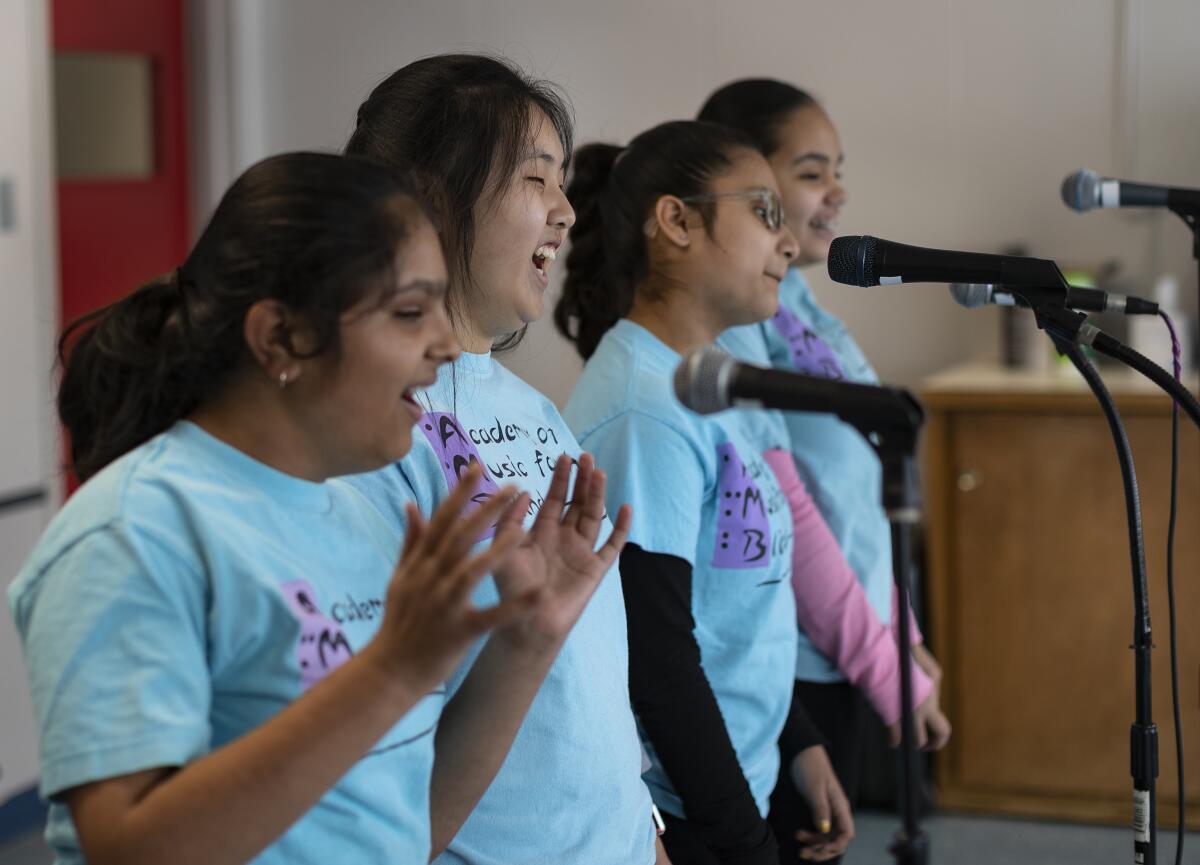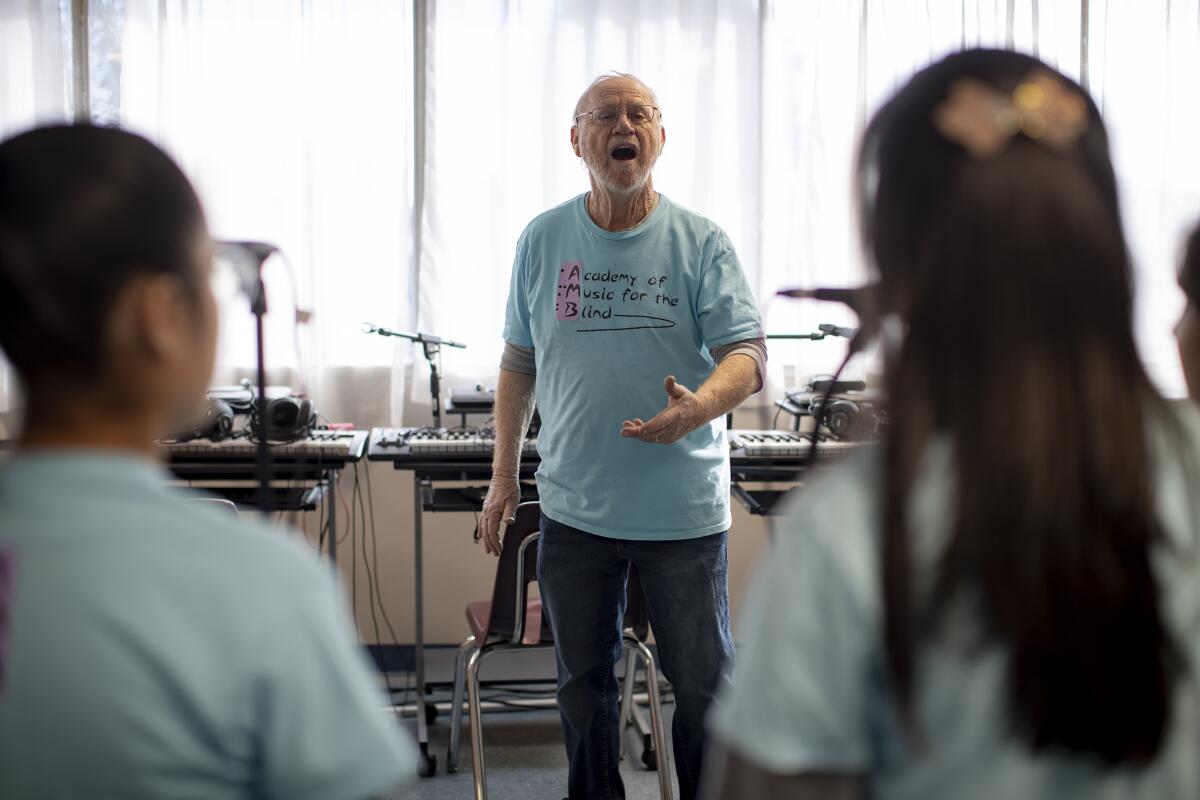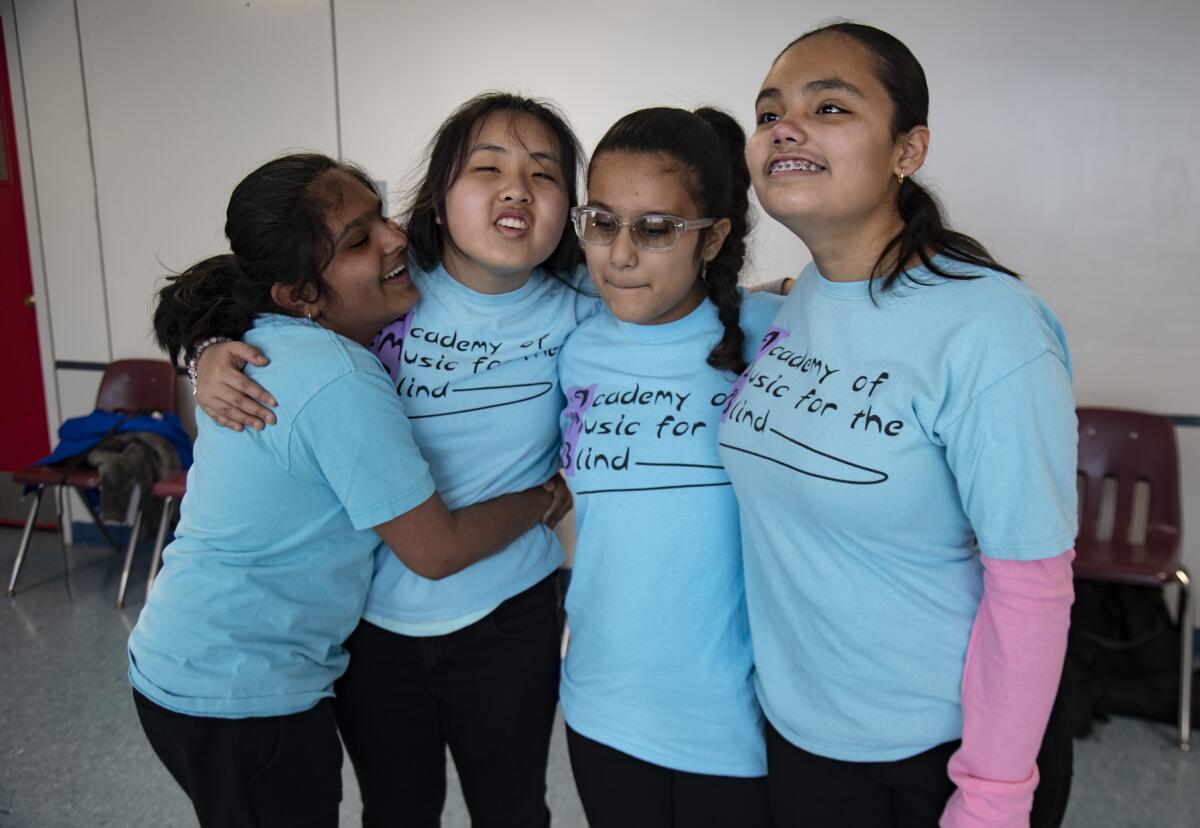The blind girls of Acabella: Pitch perfect and in total harmony

- Share via
Natalie Fuentes used to get bored during choir rehearsals at her middle school in Bell. A 12-year-old with a remarkably soulful, powerhouse voice, Fuentes has perfect pitch, adores Ariana Grande’s music and has been blind since birth.
At school, her sighted classmates often needed much more time to learn their vocal parts than she did, which could frustrate her. But Fuentes has found a group that moves at her speed, a place where there are no limits to how far she can go musically.
Fuentes is a member of Acabella, an a cappella group made up of the best female singers at the Academy of Music for the Blind in Whittier. This weekend, the group will perform Mozart’s “Ave Verum Corpus” as part of the Pasadena Master Chorale’s “Life of Mozart” concerts, which also feature Mozart’s Requiem in D minor.
Natalie, 14-year-old Dorothy Cho and 12-year-olds Riya Golakiea and Brianna Vieyra needed just 40 minutes to master “Ave Verum Corpus” on a recent Saturday.
“That’s what is so amazing about these kids. They are the best musicians. They can learn a piece from scratch, perfectly, just like that,” says David Pinto, snapping his fingers to emphasize how quickly his students digest material.

Pinto is the executive director of AMB and director of Acabella. He and his wife, Gayle Pinto, founded the school 18 years ago, running it out of their home before moving into a bigger space as demand grew.
Pinto and a dozen other music teachers spend every Saturday with 12 blind students at the school, located on the campus of Calvary Baptist Church.
To be admitted to the school, Pinto says a student must be totally blind, possess appropriate social skills and musical aptitude, learn at a normal or faster-than-normal pace, and be physically capable of playing an instrument. He estimates about 50 such children live in the Los Angeles area.
For AMB students, Saturdays are a day of rigorous musical instruction during which they take lessons in piano, voice, ukulele, guitar, flute, percussion, music theory and composition. AMB students also learn specialized skills like how to read Braille musical notation and operate computer programs, developed by Pinto, that are blind-accessible versions of Garage Band and the musical notation software Sibelius.
All four members of Acabella, like many of their AMB classmates, possess absolute (or perfect) pitch. Typically, before an a cappella group sings, a pitch pipe or piano indicates a note so that everyone begins in the same key. But Acabella doesn’t need that aid; the singers know exactly what each note on the piano sounds like, and they can locate it instantly and precisely.
Demonstrating the skill, Dorothy took a deep breath as a cue, and then she, Natalie and Riya released a warmly blended C Major chord. When the sound of their voices quieted, Pinto played a C Major chord on his keyboard to check their tone.
“Perfect. Let’s try something harder,” he said. “Sing the first three notes of the chromatic scale, starting on C.”
With a unified exhale, the three singers produced the complex, dissonant chord effortlessly.
“I like the crushy wushy one the best,” Riya said with a giggle, describing the clustered tones of the chromatic scale.
“I like the C Major chord because it’s that nice blend that I’ve been hearing,” Dorothy added. “I feel like our group really does shine in terms of harmony. We blend really well. We don’t all have the exact same voice or exact same style, but our voices come together into one. I think that’s what’s really special about us.”
Pinto believes that everyone is born with the potential to have absolute pitch but that most seeing people lose the ability as sight takes over as their dominant sense. By some estimates, only about 1% of the population possesses the skill, although that number can be higher among musicians who start training early and among singers in places such as China, where hearing is honed by the speaking of a tonal language.

Absolute pitch is much more common among the blind.
“If someone has been totally blind from birth, there’s a much, much better chance they’ll keep that perfect pitch because they’re relying on that sense,” Pinto said.
Pinto, 75, is not blind. A native of London, he said he participated in the first Van Cliburn International Piano Competition in 1962 and still enjoys performing a piano concerto with symphony orchestras at least once a year.
His passion for educating blind musicians was sparked in 1995 when a blind student accidentally walked into a class he was teaching at Pierce College in Woodland Hills. The student was talented musically but unable to use computer software designed for the sighted, a problem Pinto became obsessed with solving.
Two weeks ago, as Pinto and Pasadena Master Chorale Music Director Jeffrey Bernstein prepared Acabella for this weekend’s concerts, Pinto included his students in the decision-making process. In between lively discussions about tempo and key, he and Bernstein talked with the girls about Mozart’s life, describing the important role they’ll play in bringing the composer to life.
“I think Mozart can hear us everywhere we go,” Natalie chimed in.
“What does that mean to you?” Pinto asked.
“He’s dead, but his spirit is basically in the sky,” Natalie said. “Just because he’s dead doesn’t mean he can’t create music.”
“That’s right,” Pinto said. “The spirit of Mozart’s music is alive through us, right now.”
Pasadena Master Chorale with Acabella
Where: Altadena Community Church, 943 E. Altadena Drive, Altadena
When: 7:30 p.m. Saturday and 4 p.m. Sunday
Tickets: Pay what you will Saturday; $25 Sunday
Info: pasadenamasterchorale.org, ouramb.org
Support our coverage of local music. Become a digital subscriber.
More to Read
The biggest entertainment stories
Get our big stories about Hollywood, film, television, music, arts, culture and more right in your inbox as soon as they publish.
You may occasionally receive promotional content from the Los Angeles Times.










